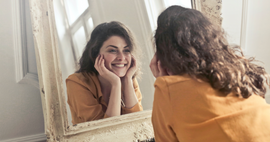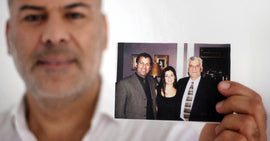The $411 Billion Problem: Sleep Anxiety & One Unusual Theory That Might Help You Beat It
If you’re not sleeping as well as you’d like then you’re like most of us. More than one-third of American adults are getting less than seven hours of sleep a night. A lack of sleep increases the risk of obesity, diabetes, high blood pressure, stroke, mental illness, and heart disease. To make matters even worse, a study published by the Rand Corp. put the financial loss to US companies at up to $411 billion a year. If you were lucky to be catching enough zzz’s before, chances are you won’t be after reading those stats.
So what’s keeping everyone up at night? The Sleep Health Foundation confirms that everyone, to a greater or lesser extent, wakes up at night. Some people may wake up and worry about it, while others don’t. But worrying about sleep usually makes getting there much harder. 40 million of us report chronic, long-term sleep disorders, or occasional sleeping problems. Could stress and anxiety be causing sleep issues or making existing problems worse?
Anxious in America
No surprise, the number of people reporting sleep issues coincides with rising stress levels across America. A 2017 national survey examined the sources of stress and its impact on the health and well-being of Americans. The results demonstrated a significant increase in stress for the first time since 2007. 31% of Americans said their stress has increased, while a 20% reported experiencing extreme stress (a rating of 8, 9 or 10 on the 10-point scale).
Is it any wonder that so many of us have feelings of tension, unease, nervousness, and racing thoughts at bedtime given this increase in stress? Probably not. But Andrea Goldstein, a UC Berkeley doctoral student in neuroscience and lead author of a sleep deprivation study says, “It’s been hard to tease out whether sleep loss is simply a byproduct of anxiety, or whether sleep disruption causes anxiety.” At some point, it’s hard to tell whether you’re having trouble sleeping because you’re anxious, or you’re anxious because you can’t sleep. In this ‘which came first’ situation, treating sleep anxiety becomes more than a question of how to reduce our stress so we can sleep better. Rather, it becomes a battle against a perpetuating and vicious sleepless cycle. But, according to Goldstein, one thing is for certain: a lack of sleep puts the anxiety-prone among us at risk of developing an anxiety disorder.
Becoming anxious about sleep is actually a form of performance anxiety, says Alexander Obolsky, MD, a psychiatrist who specializes in trauma and stress. Some adults, for instance, get worried because the amount of sleep they get diminishes. “They get anxious because they think they’re not sleeping enough,” Obolsky says. For UC Berkeley researchers, this makes complete sense. Their sleep study showed a lack of sleep plays a role in ramping up brain regions that trigger excessive worry. So what can we do to actually reduce sleep anxiety?
Most people say to take a deep breath to calm yourself down but that might be exactly the wrong thing to do.
Interpret anxiety as excitement
Anxiety is the same stimuli as excitement. Both emotions cause a racing pulse, shortness of breath, and elevated blood pressure. Author and public speaker, Simon Sinek suggests learning to interpret anxiety as excitement. Like Cognitive Behavioural Therapy, he says to tell yourself you’re feeling excited and not anxious until this becomes a habit. Top athletes do this – they’ve learned to interpret their bodies’ signals as excitement and not nerves. “Take two Olympians who are equally trained, equally fit, equally talented,” says Sinek, “If [Vikram] Chib could compare their brain scans, he’d have a good idea about which one is most likely to choke under pressure during the games: it’s whoever is most excited about winning gold, and all the pride, glory and potential cash that comes with it.” If we replace“most excited” with “most anxious” it’s easy to grasp why the athlete choked.
Vikram Chib, assistant professor of biomedical engineering at the Kennedy Krieger Institute, studies how incentives motivate performance. He’s found that when people are playing for high stakes, those likely to choke have wild swings of activity in an area deep in the brain that encodes value. In these people, the bigger the incentive, the more the area lights up. But once they start the activity where money is on the line, that activity plummets, the same way it would when someone thinks about losing, or maybe thinks about how much sleep they’re losing?
The athletes most likely to bring home a medal, Chib says, are either hard-wired to keep their cool when the stakes are high, or they’ve found a way to get mentally in the zone. “We found when you frame things appropriately, your neural activity stays pretty constant. You don’t get really amped up for high gains or really depressed for losses,” he says. “The people that can maintain very stable reward activity tend to be the ones that don’t choke under pressure.” Can the same thing be said about sleep anxiety?
According to this schema, trying to calm down during a bout of anxiety is likely futile. Do we stand a better chance at sleeping soundly if we move first from an anxious mindset to one of excitement? Alison Wood Brooks, a professor at Harvard Business School, offers one theory: reframe your mindset by saying: “I am excited”
Because anxiety and excitement are both arousal emotions with similar symptoms, it’s easier to get from one to the other than to completely shift gears into calmness, says Alison Wood Brooks, who studied this phenomenon. Get yourself out of a “threat mindset” where you’re focusing on all the things that could go wrong and get yourself into an opportunity mindset where you focus instead on all the things that could go well to help you frame things properly. As Vikram Chib stated, you don’t actually become less anxious, you just fair better.
With anxiety arousal stays high, cortisol surges and the body prepares for action,disrupting your melatonin production, and therefore making it easier to go from anxiety to excitement than anxiety to calm. Wood Brooks calls this technique of telling yourself you’re instead excited “anxiety reappraisal”. The people she studied who practiced this technique reportedly gave better public speeches, sang better during a karaoke study, and did better on a math test. How much better? People were 17% more persuasive when singing Karaoke and did 22% better on a math test than people who did nothing or tried to remain calm. Could telling ourselves we’re excited to tackle our days tomorrow be a key to calming our anxious minds?
At the very least, says Wood Brooks, say you’re excited. It won’t change your fear when anxious, but, if anything, it can only have a positive effect. To apply this theory to sleep anxiety, focus instead on the restful sleep you imagine having, and all the things that could go right in your day tomorrow. See if that helps you get closer to calm. At the very least, it can’t hurt!
If all else fails, use a sleep tracker to supplement your mindset
At the Stanford Sleep Medicine Center, scientists assessed how well sleep tracking wearable devices on the market matched the center’s own overnight sleep studies. Kushida’s conclusion? “Consumer wearable devices are not there in accurately detecting the stages of sleep.” The problem: They focus on motion, which can be deceptive since a person could be lying in bed awake or a restless sleeper.
Tracking sleep with the help of a wearable is, therefore, more useful at this point in time as a tool in your kit to understand your sleeping patterns. They also help you track how your daily stress contributes to sleep anxiety. It’s important to track more than just your motion to fully understand the bigger picture of your sleep health. Tracking vitals like your heart rate, temperature, daily stress and activity levels is key. Drawing connections between these complex factors are the only way to get an accurate picture of what happens when your head hits the pillow at night.
How can you do that? One way is with Skiin garments, designed with six sensors that allow you to comfortably and invisibly track daily activity, sleep, and stress levels.
The diverse sensor and actuator mix enable you to gain ‘holistic insight’ into your physical and mental state. It’s also the first product that, being comfortable and washable, is truly wearable.
Becoming aware of your anxiety triggers is the first step toward training your mind to reframe the input. It’s also the first step toward a better night’s sleep. It also provides end of day reports or weekly summaries so you can retroactively consult your data to see how it correlates with your life’s events.
But if you haven’t secured yourself a pair, here are some supplemental mindful bedtime tips to help wind you down:
- Restrict your technology use to outside of the bedroom and limit your exposure an hour before bed. Computer and phone screens emit a bluish light. That lightsuppresses the secretion of melatonin, a hormone that influences circadian rhythms. Most new phones and computers have a blue light filter option which can be set to automatically come on in the evening and turn off in the morning. Using this function can help you maintain natural circadian rhythms.
- Mimic sunrise and sunset with smart lights in your bedroom that dim and change hues. Studies show we prefer an orange light (like a sunset) in the evening. Orange light stimulates melatonin production. In the morning we prefer a blueish light (like sunrise) which suppresses melatonin and allows us to wake up more naturally.
- Try to restrict your food intake 3 hours before sleep and especially avoid heavy foods,which have been linked to insomnia. Keep the room temperature a little bit cooler (60 to 75 degrees Fahrenheit). Dr. Christopher Winter, Medical Director at Charlottesville Neurology & Sleep Medicine, says temperatures above 75 degrees and below 54 degrees can disrupt sleep
- Take a warm bath before bed. The rise and then fall in body temperature is said to promote drowsiness.
- Avoid physically and mentally stressful or demanding tasks leading up to sleep (ie. work emails, emotional conversation, weightlifting) to prime your mind for a restful night’s sleep
- Try to maintain a consistent sleep schedule or, at the very least, wake up at the same time every day. A consistent routine can make both falling asleep and getting up in the morning easier, less stressful, and more relaxing
Try out these tips for yourself and let us know if reframing your mind to interpret your anxiety as excitement helped you with your sleep anxiety. At the very least, you might stand a better chance at slowing those racing thoughts.
Learn how we’re turning your clothes into computers.
Join our journey to the future of smart clothing.
By subscribing you agree to receive periodic marketing emails from us.
This article is not intended to substitute for informed medical advice. You should not use this information to diagnose or treat a health problem or condition. Always check with your doctor before changing your diet, altering your sleep habits, taking supplements, or starting a new fitness routine.




